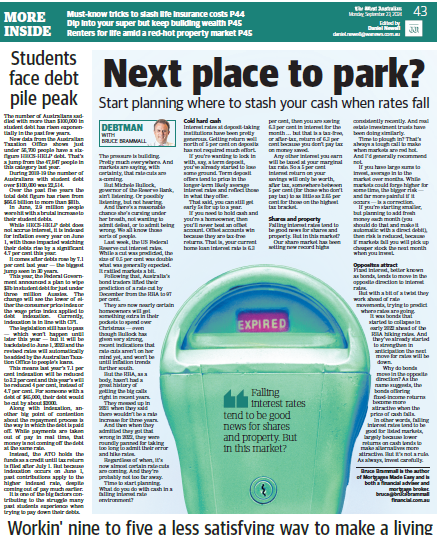
Bruce Brammall, The West Australian, 23 September 2024
The pressure is building. Pretty much everywhere. And markets are saying, with certainty, that rate cuts are a-coming.
But Michele Bullock, chair of the Reserve Bank, ain’t listening. Or possibly listening, but not hearing.
And there’s a reasonable chance she’s cursing under her breath, not wanting to admit defeat, or to admit being wrong. We all know those sorts of people.
Last week, the US Federal Reserve cut interest rates. While a cut was predicted, the size of 0.5 per cent was double what was generally expected. It rattled markets a bit.
Following that, Australia’s bond traders lifted their prediction of a rate cut by December from the RBA, to 97 per cent. They are now nearly certain homeowners will get something extra in their pockets to spend over Christmas.
Even though Bullock has given very strong, recent, indications that rate cuts aren’t on her mind yet. And won’t be until inflation trends further south.
But the RBA, as a body, hasn’t had a great history of getting the big calls right in recent years. They messed up in 2021 when they said there wouldn’t be a rate increase for three years. And then when they admitted they got that wrong in 2022, they were roundly panned for taking too long to admit their error and hike rates.
Regardless of when, it’s now almost certain rate cuts are coming. And they’re probably not too far away.
Time to start planning. What do you do with cash in a falling interest rate environment?
Cold hard cash
Interest rates at deposit-taking institutions have been pretty generous. Getting return well north of 5 per cent on deposits has not required much effort.
If you’re wanting to lock in with, say, a term deposit, you’ve already started to lose some ground. TD offers tend to price in the longer term likely average interest rates and reflect those in what they offer.
That said, you can still get early 5s for TDs up to a year.
If you need to hold cash and you’re a homeowner, then you’ll never beat an offset account. Offset accounts win because they are tax-free returns.
That is, your current home loan interest rate is 6.3 per cent, then you are saving 6.3 per cent in interest for the month … but that is a tax-free, or after-tax, return of 6.3 per cent, because you don’t pay tax on money saved.
Any other interest you earn will be taxed at your marginal tax rate. So a 5 per cent interest return on your savings, will only be worth, after tax, somewhere between 5 per cent (for those who don’t pay tax) to as little as 2.65 per cent for those on the highest tax bracket.
Shares and property
Falling interest rates tend to be good news for shares and property. But in this market?
Our share market has been setting new record highs consistently recently. And real estate investment trusts have been doing similarly.
Time to plough in? That’s always a tough call to make when markets are red hot. And I’d generally recommend not.
If you have large sums to invest, average in to the market over months. While markets could forge higher for some time, the bigger risk, and far more painful if it occurs, is a correction.
If you’re starting smaller, but planning to add fresh money each month (you should do that and make it automatic with a direct debit), then risk is reduced, because if markets fall, you will pick up cheaper stock the next month when you invest.
Opposites attract
Fixed interest, or bonds, tend to move in the opposite direction to interest rates. But with a bit of a twist – they work ahead of interest rate movements, trying to predict where rates are going.
It was bonds that started to collapse in early 2022 ahead of the RBA hiking rates. And they’ve already started to strengthen, in anticipation the next move for rates will be down.
Why do bonds move in the opposite direction to interest rates? Because, as the name suggests, the bonds offering fixed income returns become more attractive when the price of cash falls.
In other words … falling interest rates tend to be good for listed markets, largely because lower returns on cash tends to make alternatives more attractive.
But it’s not a rule. As always, invest carefully.
Bruce Brammall is the author of Mortgages Made Easy and is both a financial adviser and mortgage broker. E: bruce@brucebrammallfinancial.com.au.
